外研版英语中考语言基础知识梳理与训练 第6课 七年级下册 Modules 9—12
文档属性
| 名称 | 外研版英语中考语言基础知识梳理与训练 第6课 七年级下册 Modules 9—12 | 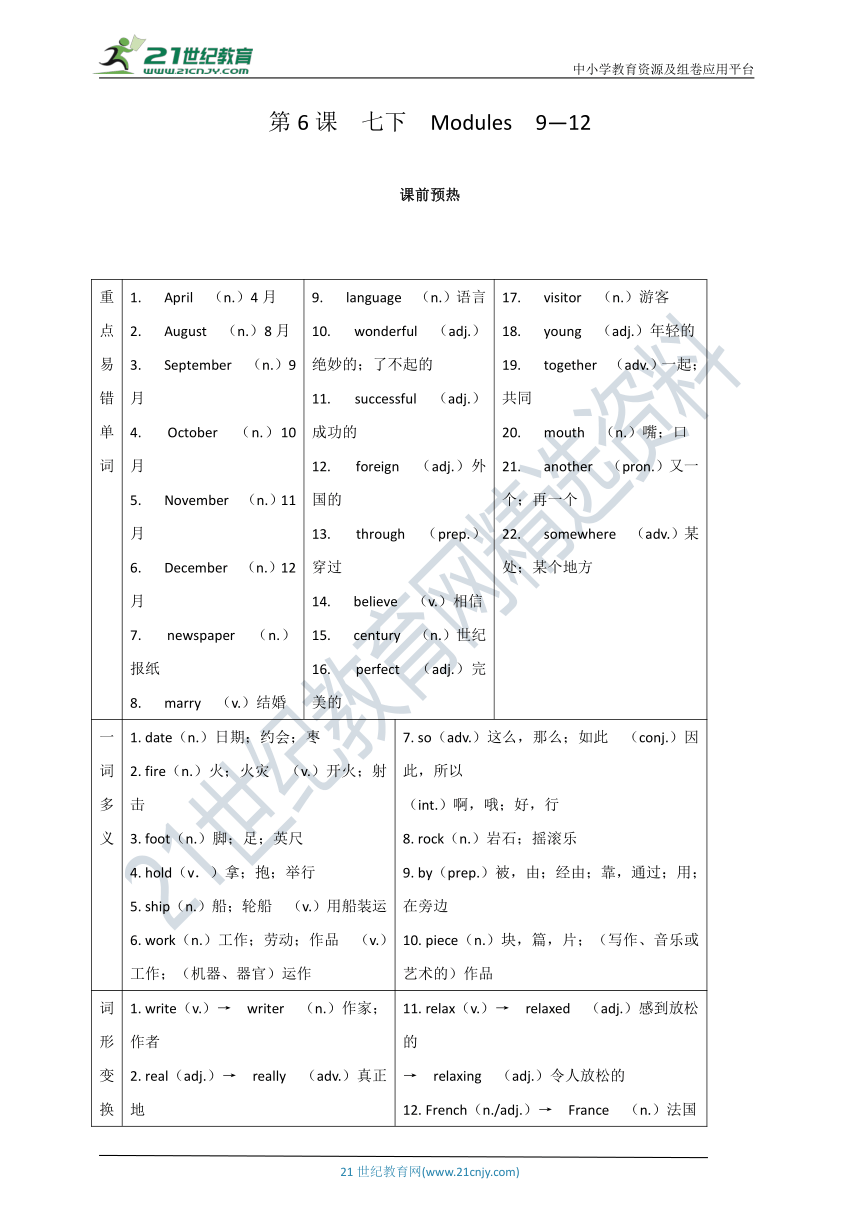 | |
| 格式 | doc | ||
| 文件大小 | 1.3MB | ||
| 资源类型 | 试卷 | ||
| 版本资源 | 外研版 | ||
| 科目 | 英语 | ||
| 更新时间 | 2022-02-05 08:51:57 | ||
图片预览

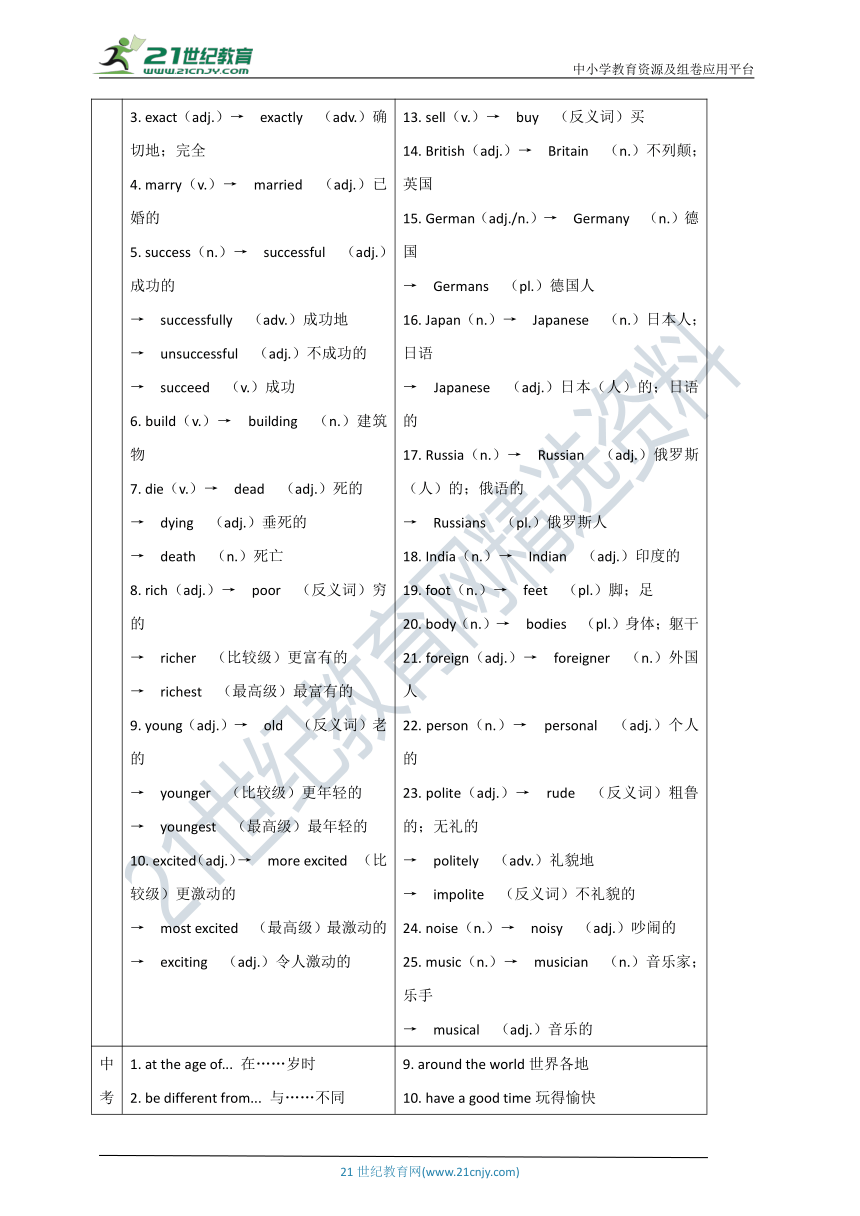
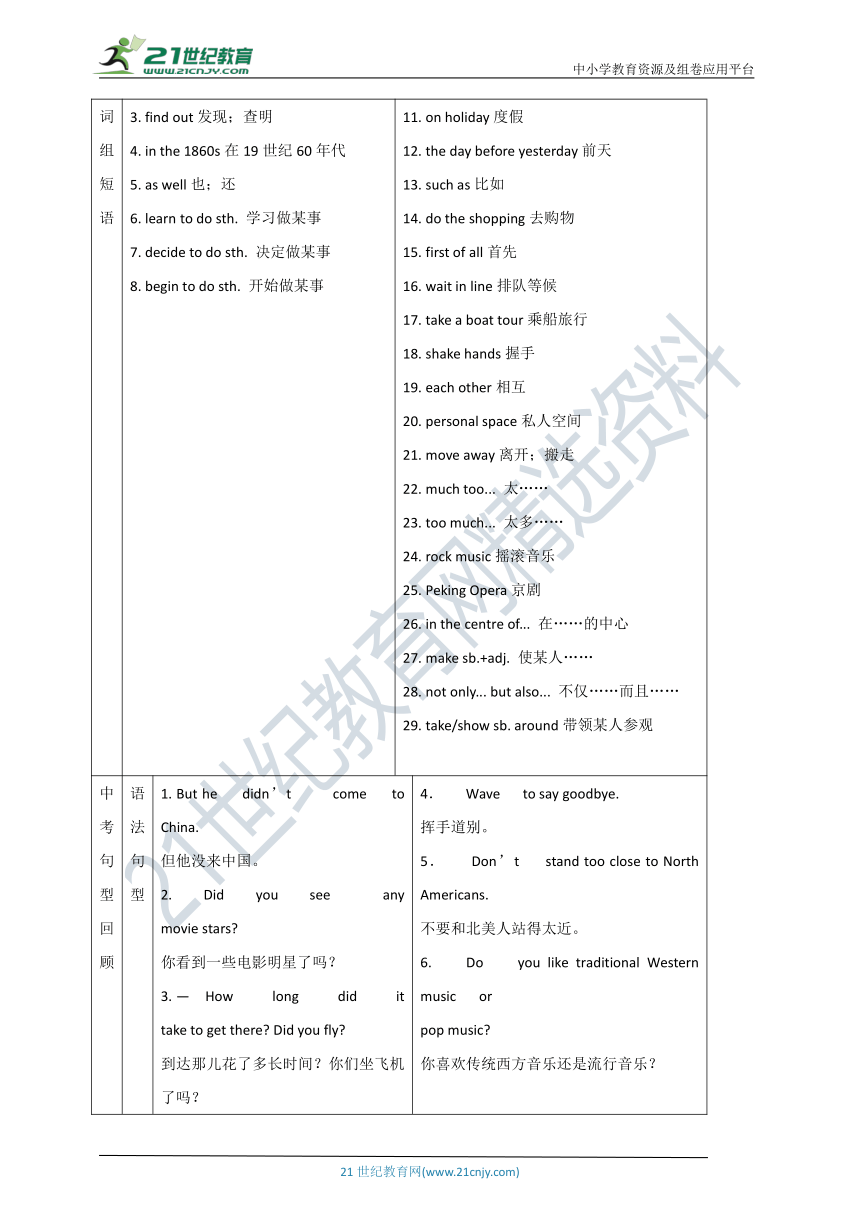
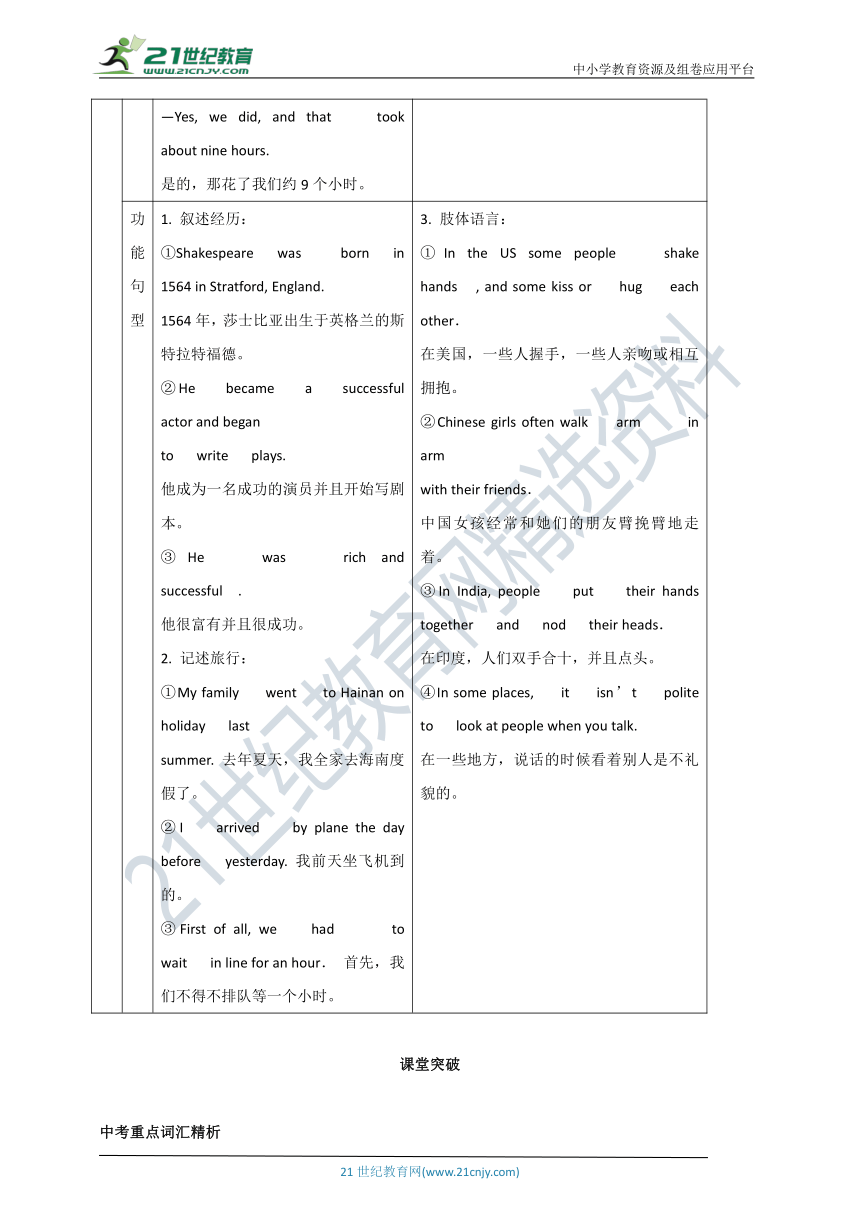
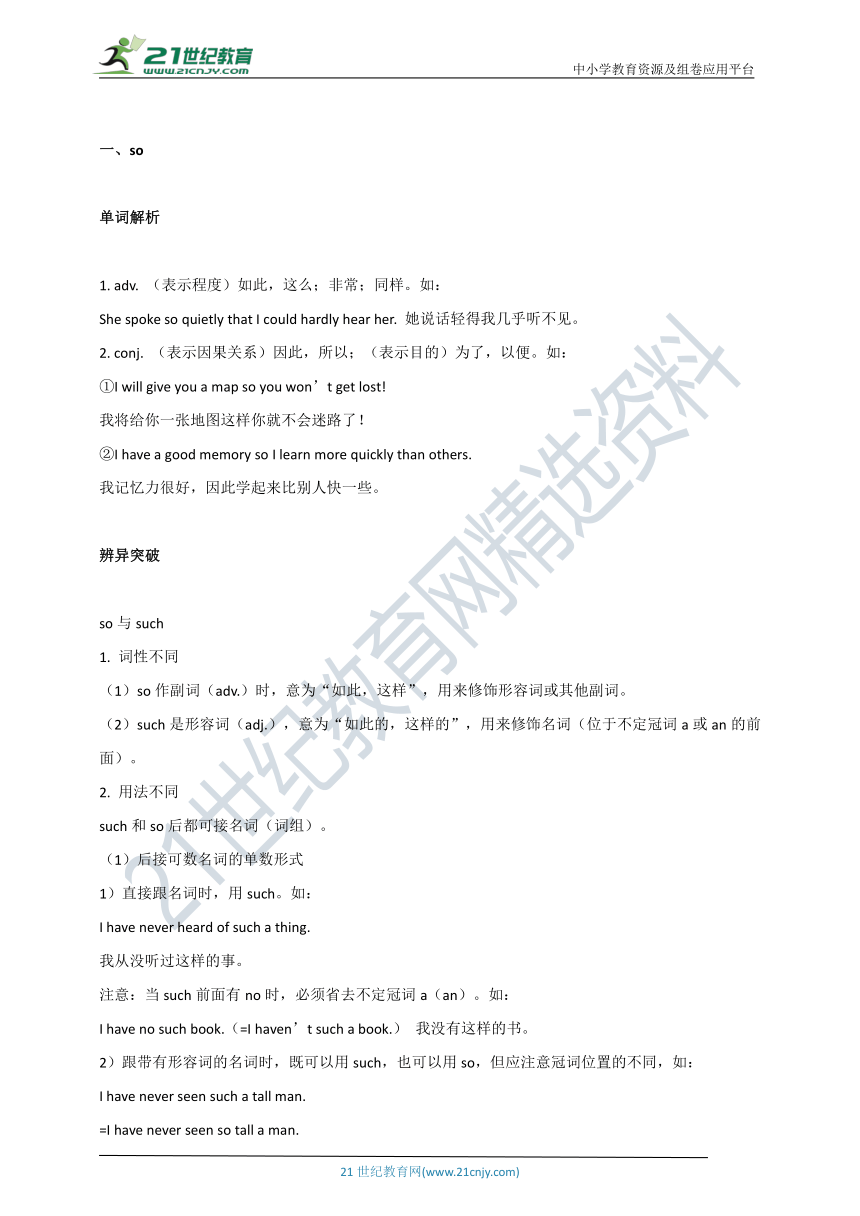
文档简介
中小学教育资源及组卷应用平台
第6课 七下 Modules 9—12
课前预热
重点易错单词 1. April (n.)4月2. August (n.)8月3. September (n.)9月4. October (n.)10月5. November (n.)11月6. December (n.)12月7. newspaper (n.)报纸8. marry (v.)结婚 9. language (n.)语言10. wonderful (adj.)绝妙的;了不起的11. successful (adj.)成功的12. foreign (adj.)外国的13. through (prep.)穿过14. believe (v.)相信15. century (n.)世纪16. perfect (adj.)完美的 17. visitor (n.)游客18. young (adj.)年轻的19. together (adv.)一起;共同20. mouth (n.)嘴;口21. another (pron.)又一个;再一个22. somewhere (adv.)某处;某个地方
一词多义 1. date(n.)日期;约会;枣2. fire(n.)火;火灾 (v.)开火;射击3. foot(n.)脚;足;英尺4. hold(v.)拿;抱;举行5. ship(n.)船;轮船 (v.)用船装运6. work(n.)工作;劳动;作品 (v.)工作;(机器、器官)运作 7. so(adv.)这么,那么;如此 (conj.)因此,所以 (int.)啊,哦;好,行8. rock(n.)岩石;摇滚乐9. by(prep.)被,由;经由;靠,通过;用;在旁边10. piece(n.)块,篇,片;(写作、音乐或艺术的)作品
词形变换 1. write(v.)→ writer (n.)作家;作者2. real(adj.)→ really (adv.)真正地3. exact(adj.)→ exactly (adv.)确切地;完全4. marry(v.)→ married (adj.)已婚的5. success(n.)→ successful (adj.)成功的→ successfully (adv.)成功地→ unsuccessful (adj.)不成功的→ succeed (v.)成功6. build(v.)→ building (n.)建筑物7. die(v.)→ dead (adj.)死的→ dying (adj.)垂死的→ death (n.)死亡8. rich(adj.)→ poor (反义词)穷的→ richer (比较级)更富有的→ richest (最高级)最富有的9. young(adj.)→ old (反义词)老的→ younger (比较级)更年轻的→ youngest (最高级)最年轻的10. excited(adj.)→ more excited (比较级)更激动的→ most excited (最高级)最激动的→ exciting (adj.)令人激动的 11. relax(v.)→ relaxed (adj.)感到放松的→ relaxing (adj.)令人放松的12. French(n./adj.)→ France (n.)法国13. sell(v.)→ buy (反义词)买14. British(adj.)→ Britain (n.)不列颠;英国15. German(adj./n.)→ Germany (n.)德国→ Germans (pl.)德国人16. Japan(n.)→ Japanese (n.)日本人;日语→ Japanese (adj.)日本(人)的;日语的17. Russia(n.)→ Russian (adj.)俄罗斯(人)的;俄语的→ Russians (pl.)俄罗斯人18. India(n.)→ Indian (adj.)印度的19. foot(n.)→ feet (pl.)脚;足20. body(n.)→ bodies (pl.)身体;躯干21. foreign(adj.)→ foreigner (n.)外国人22. person(n.)→ personal (adj.)个人的23. polite(adj.)→ rude (反义词)粗鲁的;无礼的→ politely (adv.)礼貌地→ impolite (反义词)不礼貌的24. noise(n.)→ noisy (adj.)吵闹的25. music(n.)→ musician (n.)音乐家;乐手→ musical (adj.)音乐的
中考词组短语 1. at the age of... 在……岁时2. be different from... 与……不同3. find out发现;查明4. in the 1860s在19世纪60年代5. as well也;还6. learn to do sth. 学习做某事7. decide to do sth. 决定做某事8. begin to do sth. 开始做某事 9. around the world世界各地10. have a good time玩得愉快11. on holiday度假12. the day before yesterday前天13. such as比如14. do the shopping去购物15. first of all首先16. wait in line排队等候17. take a boat tour乘船旅行18. shake hands握手19. each other相互20. personal space私人空间21. move away离开;搬走22. much too... 太……23. too much... 太多……24. rock music摇滚音乐25. Peking Opera京剧26. in the centre of... 在……的中心27. make sb.+adj. 使某人……28. not only... but also... 不仅……而且……29. take/show sb. around带领某人参观
中考句型回顾 语法句型 1. But he didn’t come to China.但他没来中国。2. Did you see any movie stars 你看到一些电影明星了吗?3. — How long did it take to get there Did you fly 到达那儿花了多长时间?你们坐飞机了吗?—Yes, we did, and that took about nine hours.是的,那花了我们约9个小时。 4. Wave to say goodbye. 挥手道别。5. Don’t stand too close to North Americans.不要和北美人站得太近。6. Do you like traditional Western music or pop music 你喜欢传统西方音乐还是流行音乐?
功能句型 1. 叙述经历:①Shakespeare was born in 1564 in Stratford, England.1564年,莎士比亚出生于英格兰的斯特拉特福德。②He became a successful actor and beganto write plays.他成为一名成功的演员并且开始写剧本。③He was rich and successful .他很富有并且很成功。2. 记述旅行:①My family went to Hainan on holiday last summer. 去年夏天,我全家去海南度假了。②I arrived by plane the day before yesterday. 我前天坐飞机到的。③First of all, we had to wait in line for an hour. 首先,我们不得不排队等一个小时。 3. 肢体语言:①In the US some people shake hands , and some kiss or hug each other.在美国,一些人握手,一些人亲吻或相互拥抱。②Chinese girls often walk arm in arm with their friends.中国女孩经常和她们的朋友臂挽臂地走着。③In India, people put their hands together and nod their heads.在印度,人们双手合十,并且点头。④In some places, it isn’t polite to look at people when you talk.在一些地方,说话的时候看着别人是不礼貌的。
课堂突破
中考重点词汇精析
一、so
单词解析
1. adv. (表示程度)如此,这么;非常;同样。如:
She spoke so quietly that I could hardly hear her. 她说话轻得我几乎听不见。
2. conj. (表示因果关系)因此,所以;(表示目的)为了,以便。如:
①I will give you a map so you won’t get lost!
我将给你一张地图这样你就不会迷路了!
②I have a good memory so I learn more quickly than others.
我记忆力很好,因此学起来比别人快一些。
辨异突破
so与such
1. 词性不同
(1)so作副词(adv.)时,意为“如此,这样”,用来修饰形容词或其他副词。
(2)such是形容词(adj.),意为“如此的,这样的”,用来修饰名词(位于不定冠词a或an的前面)。
2. 用法不同
such和so后都可接名词(词组)。
(1)后接可数名词的单数形式
1)直接跟名词时,用such。如:
I have never heard of such a thing.
我从没听过这样的事。
注意:当such前面有no时,必须省去不定冠词a(an)。如:
I have no such book.(=I haven’t such a book.) 我没有这样的书。
2)跟带有形容词的名词时,既可以用such,也可以用so,但应注意冠词位置的不同,如:
I have never seen such a tall man.
=I have never seen so tall a man.
我从没看过这么高的人。
(2)后接可数名词的复数形式或集合名词,无论有无修饰语都用such。如:
①Such things often happen in our daily life.
这样的事在我们的日常生活中经常发生。
②Such people are dangerous.
这样的人是危险的。
(3)后接不可数名词,无论有无修饰语都用such。如:
Did you ever see such weather
你看过这样的天气吗?
(4)当复数名词或集合名词之前有few, many;不可数名词之前有little, much修饰时,用so。如:so many people/so many students/so few days;so much time/so much money/so little time等。
(5)当many, much, little, few单独作为名词使用时,用so。如:
①There are so few that I can’t give you one.
数量太少了,我一个都不能给你。
②This is the girl I have told you so much about.
这就是我已经和你讲过很多的那个女孩。
(6)such可以和all, some, other, another, one, no, many, any, few, several等词同时修饰一个名词,但它的位置通常是放在这些词的后面。如:
I need some such cards.
我需要一些这样的卡片。
活学活用
根据句意,用such或so完成句子。
1. I need some_________________ cards.
2. All_________________ situations must be considered.
3. Whales are_________________ smart that they communicate with each other.
4. He is not_________________ clever a boy as his brother.
5. This is the girl I have told you_________________ much about.
6. I have never heard of_________________ a thing.
7. She made_________________ rapid progress that she soon began to write articles in English.
8. He is not_________________ a clever boy as his brother.
9. We have had several_________________ Chinese paintings already.
10. One_________________ dictionary is enough for me.
二、by
单词解析
1. prep. 靠近,在……旁;在……时间;不迟于;被;用;由;乘(车)。如:
①The telephone is by the window.
电话在窗户旁边。
②He was knocked down by a bus.
他被公共汽车撞倒了。
③Can you finish the work by five o’clock
你五点钟前能完成工作吗?
④He walked by me without speaking.
他一言不发地从我身边走过。
⑤I will contact you by letter.
我会给你写信联系的。
2. adv. 经过;表示保留或保存时用;短暂拜访。如:
①He hurried by without speaking to me.
他没和我说话就匆匆过去了。
②I’ll come by this evening and pick up the books.
我今晚过来取书。
常用短语:pass by 经过,走过,逝去;drop by 顺便拜访;one by one一个接一个;side by side肩并肩的(=shoulder to shoulder);by hand 手工;by mistake错误地;by accident/chance偶然;step by step逐步地;by turns轮流;by the way 顺便问一下;by the end of到……末;by oneself 独自,单独。
活学活用
填入适当的词或用所给词的适当形式填空。
1. As time went_________________ , people’s attitudes slowly changed.
2. Dad, would you like to come and sit_________________ me
3. The man_________________ (catch) by the police yesterday.
4. By_________________ (do) extra homework, he soon got ahead of his classmates.
5._________________ the time he was ten, he had learnt about 1,000 English words.
6. They crossed the river_________________ boat.
7. What do you mean_________________ the sentence
8. By_________________ way, how do you like coming to work for me
9. He is learning English by_________________ (he).
10. I had learnt five hundred words by the end_________________ last term.
三、work
单词解析
1. v. 工作;(机器/器官等)运转,活动。如:
Do you enjoy working with children
你喜欢做儿童工作吗?
2. n. 工作;劳动;事情;作品;著作。如:
Her works are very famous and all of us like reading her works.
她的作品很有名,我们都喜欢读她的作品。
延伸:working工作上的;工作时间的。out of
work失业。如:
She had been out of work for a year.
她已经失业一年了。
辨异突破
work与job
这两个名词都含有“工作”的意思。但有区别:
1. work是个普通用词,泛指一切工作,是不可数名词。如:
①A teacher’s work is teaching.
老师的工作就是教学。
②I usually finish work at 5 pm.
我通常在下午5点下班。
2. job(为获取报酬所做的)工作、职业,既可指固定的工作,也可指临时的或某项具体的工作,是可数名词,前面可用不定冠词a,复数形式是jobs。如:
①Tom’s father is looking for a job.
汤姆的爸爸在找工作。
②There were just not enough jobs.
没有那么多的工作(可干)。
活学活用
A)填入适当的词或用所给词的适当形式填空。
1._________________ (work) time is the period of time that a person spends at paid labour.
2._________________(work) in the garden is_________________hard job.
3. What_________________ wonderful piece of work!
4. I have two_________________ (job), besides managing dancers.
5. The pupils are now_________________ (work) in the field.
6. He was out_________________ work when the factory closed down.
7. She kept on_________________ (work) although she was tired.
8. There are many_________________ (work) of art in the City Museum.
B)选词填空。
9. I go to_________________ (job/work) at 8 o’clock.
10. Her_________________ (job/work) is to look after the old in the nursing home.
11. His brother’s just lost his_________________ (job/work).
12. She often puts in twelve hours’_________________(job/work) a day.
13. To make a living, he is trying to find a part-time_________________ (job/work).
中考重点句型精析
一、What a beautiful city!多美的城市啊!
句型解析
此句是由what引导的感叹句:What+a+adj.+可数名词单数!
辨异突破
“what引导的感叹句”与“how引导的感叹句”
1. what引导的感叹句,其句式有:
(1)What+a/an+adj.+可数名词单数(+主+谓)!如:
What a lovely day!多好的天气啊!
(2)What+adj.+可数名词复数(+主+谓)!如:
What nice flowers!多美的花啊!
(3)What+adj.+不可数名词(+主+谓)!如:
What delicious food!多美味的食物啊!
2. how引导的感叹句,其句式有:How+adj./adv.(+主+谓)!如:
①How happy he is today!他今天真高兴呀!
②How fast he runs!他跑得真快啊!
温馨提示:在感叹句中,how还能修饰动词。如:
How I miss you!我多么想念你呀!
活学活用
用how或what完成下面的感叹句。
1._________________ nice people they are!
2._________________ time flies!
3._________________ a beautiful flower it is!
4._________________ nice weather it is!
5._________________ tall the man is!
二、Is this by Strauss or Mozart
这是施特劳斯写的还是莫扎特写的?
句型解析
此句型为选择疑问句,or意为“或者”。or前后两个部分形式上须一致,即同为名词,同为动词,同为动名词或同为介词短语等。如:
①Do you like traditional Western music or pop music
你喜欢西方传统音乐还是流行音乐?
②Did you come by car or on foot
你是开车来的还是走路来的?
活学活用
将下列句子用or合并为选择疑问句。
1. He likes apples. He likes bananas.
_________________he_________________ apples_________________ bananas
2. Daming went to school on foot. Daming went to school by bike.
_________________Daming go to school_________________or_________________
3. Would you like coffee Would you like tea
Would you like_________________ or_________________
当堂检测
一、选词填空
用方框中所给词语的适当形式填空。每词限用一次。
sell exact fire on holiday our
1. We need to know the_________________ time of the party.
2. It’s cold e and sit in front of the_________________.
3. —Where did you go_________________
—Well, to Hawaii.
4. Their house is different from_________________ in size.
5. —Why don’t you drive to work
—Well, I_________________ my car last week.
二、单词拼写
1. How many_________________ (语言) do you speak, Jack
2. They’ve decided to spend more time_________________ (一起).
3. The event was to take place on 6th_________________ (十二月).
4. I think she’ll be_________________ (成功的) as a photographer.
5. You shouldn’t_________________ (相信) everything you read.
6. Mark read the message and_________________ (微笑) to himself.
7. I’m looking for_________________ (某地) safe where I can leave my bike.
8. The company is_________________ (工作) hard to improve its image.
9. She stood_________________ (在……旁边) the window and looked out of it.
10. We’ll have to wait_________________ (另一个) three weeks for the results.
三、语法填空
阅读下面短文,在空白处填入一个适当的词,或填入括号中所给单词的正确形式。
Greetings from Madrid!
I can’t believe I’m finally here! The trip from Hong Kong 1_________________(be) long and tiring, but I made it. My hotel is nice and I am staying in a guest house in the central area of Madrid. I got a cheap and simple room, much 2_________________(small) than my own room back home. It only has a small bed and a shower, 3_________________ it is quite comfortable to stay in. The weather here is wonderful. It’s warm and sunny, 4_________________ clear blue skies every day. It’s great for sightseeing, because there are a lot of things to see and do. I’ve found a friendly guide here and yesterday I 5_________________(show) around the city. Tomorrow he will take 6_________________(I) to Andalusia to visit the city of Granada. I can’t wait 7_________________(see) the Alhambra Palace and other places of interest. Also, I 8_________________(real) want to try the food there—especially gazpacho, 9_________________ kind of cold soup which I hear is special, very different from anything else in Spain.
I’ll bring you back some 10_________________(present).
See you next month!
Love,
Jamie
参考答案
第6课 七下 Modules 9—12
课堂突破
【中考重点词汇精析】
一、1. such 2. such 3. so 4. so 5. so 6. such 7. such
8. such 9. such 10. such
二、1. by 2. by 3. was caught 4. doing 5. By 6. by
7. by 8. the 9. himself 10. of
三、1. Working 2. Working, a 3. a 4. jobs 5. working
6. of 7. working 8. works 9. work 10. job 11. job
12. work 13. job
【中考重点句型精析】
一、1. What 2. How 3. What 4. What 5. How
二、1. Does, like, or 2. Did, on foot, by bike 3. coffee, tea
当堂检测
一、1. exact 2. fire 3. on holiday 4. ours 5. sold
二、1. languages 2. together 3. December 4. successful
5. believe 6. smiled 7. somewhere 8. working 9. by
10. another
三、1. was 2. smaller 3. but 4. with
5. was shown/was showed 6. me 7. to see 8. really
9. a 10. presents
21世纪教育网 www.21cnjy.com 精品试卷·第 2 页 (共 2 页)
HYPERLINK "http://21世纪教育网(www.21cnjy.com)
" 21世纪教育网(www.21cnjy.com)
第6课 七下 Modules 9—12
课前预热
重点易错单词 1. April (n.)4月2. August (n.)8月3. September (n.)9月4. October (n.)10月5. November (n.)11月6. December (n.)12月7. newspaper (n.)报纸8. marry (v.)结婚 9. language (n.)语言10. wonderful (adj.)绝妙的;了不起的11. successful (adj.)成功的12. foreign (adj.)外国的13. through (prep.)穿过14. believe (v.)相信15. century (n.)世纪16. perfect (adj.)完美的 17. visitor (n.)游客18. young (adj.)年轻的19. together (adv.)一起;共同20. mouth (n.)嘴;口21. another (pron.)又一个;再一个22. somewhere (adv.)某处;某个地方
一词多义 1. date(n.)日期;约会;枣2. fire(n.)火;火灾 (v.)开火;射击3. foot(n.)脚;足;英尺4. hold(v.)拿;抱;举行5. ship(n.)船;轮船 (v.)用船装运6. work(n.)工作;劳动;作品 (v.)工作;(机器、器官)运作 7. so(adv.)这么,那么;如此 (conj.)因此,所以 (int.)啊,哦;好,行8. rock(n.)岩石;摇滚乐9. by(prep.)被,由;经由;靠,通过;用;在旁边10. piece(n.)块,篇,片;(写作、音乐或艺术的)作品
词形变换 1. write(v.)→ writer (n.)作家;作者2. real(adj.)→ really (adv.)真正地3. exact(adj.)→ exactly (adv.)确切地;完全4. marry(v.)→ married (adj.)已婚的5. success(n.)→ successful (adj.)成功的→ successfully (adv.)成功地→ unsuccessful (adj.)不成功的→ succeed (v.)成功6. build(v.)→ building (n.)建筑物7. die(v.)→ dead (adj.)死的→ dying (adj.)垂死的→ death (n.)死亡8. rich(adj.)→ poor (反义词)穷的→ richer (比较级)更富有的→ richest (最高级)最富有的9. young(adj.)→ old (反义词)老的→ younger (比较级)更年轻的→ youngest (最高级)最年轻的10. excited(adj.)→ more excited (比较级)更激动的→ most excited (最高级)最激动的→ exciting (adj.)令人激动的 11. relax(v.)→ relaxed (adj.)感到放松的→ relaxing (adj.)令人放松的12. French(n./adj.)→ France (n.)法国13. sell(v.)→ buy (反义词)买14. British(adj.)→ Britain (n.)不列颠;英国15. German(adj./n.)→ Germany (n.)德国→ Germans (pl.)德国人16. Japan(n.)→ Japanese (n.)日本人;日语→ Japanese (adj.)日本(人)的;日语的17. Russia(n.)→ Russian (adj.)俄罗斯(人)的;俄语的→ Russians (pl.)俄罗斯人18. India(n.)→ Indian (adj.)印度的19. foot(n.)→ feet (pl.)脚;足20. body(n.)→ bodies (pl.)身体;躯干21. foreign(adj.)→ foreigner (n.)外国人22. person(n.)→ personal (adj.)个人的23. polite(adj.)→ rude (反义词)粗鲁的;无礼的→ politely (adv.)礼貌地→ impolite (反义词)不礼貌的24. noise(n.)→ noisy (adj.)吵闹的25. music(n.)→ musician (n.)音乐家;乐手→ musical (adj.)音乐的
中考词组短语 1. at the age of... 在……岁时2. be different from... 与……不同3. find out发现;查明4. in the 1860s在19世纪60年代5. as well也;还6. learn to do sth. 学习做某事7. decide to do sth. 决定做某事8. begin to do sth. 开始做某事 9. around the world世界各地10. have a good time玩得愉快11. on holiday度假12. the day before yesterday前天13. such as比如14. do the shopping去购物15. first of all首先16. wait in line排队等候17. take a boat tour乘船旅行18. shake hands握手19. each other相互20. personal space私人空间21. move away离开;搬走22. much too... 太……23. too much... 太多……24. rock music摇滚音乐25. Peking Opera京剧26. in the centre of... 在……的中心27. make sb.+adj. 使某人……28. not only... but also... 不仅……而且……29. take/show sb. around带领某人参观
中考句型回顾 语法句型 1. But he didn’t come to China.但他没来中国。2. Did you see any movie stars 你看到一些电影明星了吗?3. — How long did it take to get there Did you fly 到达那儿花了多长时间?你们坐飞机了吗?—Yes, we did, and that took about nine hours.是的,那花了我们约9个小时。 4. Wave to say goodbye. 挥手道别。5. Don’t stand too close to North Americans.不要和北美人站得太近。6. Do you like traditional Western music or pop music 你喜欢传统西方音乐还是流行音乐?
功能句型 1. 叙述经历:①Shakespeare was born in 1564 in Stratford, England.1564年,莎士比亚出生于英格兰的斯特拉特福德。②He became a successful actor and beganto write plays.他成为一名成功的演员并且开始写剧本。③He was rich and successful .他很富有并且很成功。2. 记述旅行:①My family went to Hainan on holiday last summer. 去年夏天,我全家去海南度假了。②I arrived by plane the day before yesterday. 我前天坐飞机到的。③First of all, we had to wait in line for an hour. 首先,我们不得不排队等一个小时。 3. 肢体语言:①In the US some people shake hands , and some kiss or hug each other.在美国,一些人握手,一些人亲吻或相互拥抱。②Chinese girls often walk arm in arm with their friends.中国女孩经常和她们的朋友臂挽臂地走着。③In India, people put their hands together and nod their heads.在印度,人们双手合十,并且点头。④In some places, it isn’t polite to look at people when you talk.在一些地方,说话的时候看着别人是不礼貌的。
课堂突破
中考重点词汇精析
一、so
单词解析
1. adv. (表示程度)如此,这么;非常;同样。如:
She spoke so quietly that I could hardly hear her. 她说话轻得我几乎听不见。
2. conj. (表示因果关系)因此,所以;(表示目的)为了,以便。如:
①I will give you a map so you won’t get lost!
我将给你一张地图这样你就不会迷路了!
②I have a good memory so I learn more quickly than others.
我记忆力很好,因此学起来比别人快一些。
辨异突破
so与such
1. 词性不同
(1)so作副词(adv.)时,意为“如此,这样”,用来修饰形容词或其他副词。
(2)such是形容词(adj.),意为“如此的,这样的”,用来修饰名词(位于不定冠词a或an的前面)。
2. 用法不同
such和so后都可接名词(词组)。
(1)后接可数名词的单数形式
1)直接跟名词时,用such。如:
I have never heard of such a thing.
我从没听过这样的事。
注意:当such前面有no时,必须省去不定冠词a(an)。如:
I have no such book.(=I haven’t such a book.) 我没有这样的书。
2)跟带有形容词的名词时,既可以用such,也可以用so,但应注意冠词位置的不同,如:
I have never seen such a tall man.
=I have never seen so tall a man.
我从没看过这么高的人。
(2)后接可数名词的复数形式或集合名词,无论有无修饰语都用such。如:
①Such things often happen in our daily life.
这样的事在我们的日常生活中经常发生。
②Such people are dangerous.
这样的人是危险的。
(3)后接不可数名词,无论有无修饰语都用such。如:
Did you ever see such weather
你看过这样的天气吗?
(4)当复数名词或集合名词之前有few, many;不可数名词之前有little, much修饰时,用so。如:so many people/so many students/so few days;so much time/so much money/so little time等。
(5)当many, much, little, few单独作为名词使用时,用so。如:
①There are so few that I can’t give you one.
数量太少了,我一个都不能给你。
②This is the girl I have told you so much about.
这就是我已经和你讲过很多的那个女孩。
(6)such可以和all, some, other, another, one, no, many, any, few, several等词同时修饰一个名词,但它的位置通常是放在这些词的后面。如:
I need some such cards.
我需要一些这样的卡片。
活学活用
根据句意,用such或so完成句子。
1. I need some_________________ cards.
2. All_________________ situations must be considered.
3. Whales are_________________ smart that they communicate with each other.
4. He is not_________________ clever a boy as his brother.
5. This is the girl I have told you_________________ much about.
6. I have never heard of_________________ a thing.
7. She made_________________ rapid progress that she soon began to write articles in English.
8. He is not_________________ a clever boy as his brother.
9. We have had several_________________ Chinese paintings already.
10. One_________________ dictionary is enough for me.
二、by
单词解析
1. prep. 靠近,在……旁;在……时间;不迟于;被;用;由;乘(车)。如:
①The telephone is by the window.
电话在窗户旁边。
②He was knocked down by a bus.
他被公共汽车撞倒了。
③Can you finish the work by five o’clock
你五点钟前能完成工作吗?
④He walked by me without speaking.
他一言不发地从我身边走过。
⑤I will contact you by letter.
我会给你写信联系的。
2. adv. 经过;表示保留或保存时用;短暂拜访。如:
①He hurried by without speaking to me.
他没和我说话就匆匆过去了。
②I’ll come by this evening and pick up the books.
我今晚过来取书。
常用短语:pass by 经过,走过,逝去;drop by 顺便拜访;one by one一个接一个;side by side肩并肩的(=shoulder to shoulder);by hand 手工;by mistake错误地;by accident/chance偶然;step by step逐步地;by turns轮流;by the way 顺便问一下;by the end of到……末;by oneself 独自,单独。
活学活用
填入适当的词或用所给词的适当形式填空。
1. As time went_________________ , people’s attitudes slowly changed.
2. Dad, would you like to come and sit_________________ me
3. The man_________________ (catch) by the police yesterday.
4. By_________________ (do) extra homework, he soon got ahead of his classmates.
5._________________ the time he was ten, he had learnt about 1,000 English words.
6. They crossed the river_________________ boat.
7. What do you mean_________________ the sentence
8. By_________________ way, how do you like coming to work for me
9. He is learning English by_________________ (he).
10. I had learnt five hundred words by the end_________________ last term.
三、work
单词解析
1. v. 工作;(机器/器官等)运转,活动。如:
Do you enjoy working with children
你喜欢做儿童工作吗?
2. n. 工作;劳动;事情;作品;著作。如:
Her works are very famous and all of us like reading her works.
她的作品很有名,我们都喜欢读她的作品。
延伸:working工作上的;工作时间的。out of
work失业。如:
She had been out of work for a year.
她已经失业一年了。
辨异突破
work与job
这两个名词都含有“工作”的意思。但有区别:
1. work是个普通用词,泛指一切工作,是不可数名词。如:
①A teacher’s work is teaching.
老师的工作就是教学。
②I usually finish work at 5 pm.
我通常在下午5点下班。
2. job(为获取报酬所做的)工作、职业,既可指固定的工作,也可指临时的或某项具体的工作,是可数名词,前面可用不定冠词a,复数形式是jobs。如:
①Tom’s father is looking for a job.
汤姆的爸爸在找工作。
②There were just not enough jobs.
没有那么多的工作(可干)。
活学活用
A)填入适当的词或用所给词的适当形式填空。
1._________________ (work) time is the period of time that a person spends at paid labour.
2._________________(work) in the garden is_________________hard job.
3. What_________________ wonderful piece of work!
4. I have two_________________ (job), besides managing dancers.
5. The pupils are now_________________ (work) in the field.
6. He was out_________________ work when the factory closed down.
7. She kept on_________________ (work) although she was tired.
8. There are many_________________ (work) of art in the City Museum.
B)选词填空。
9. I go to_________________ (job/work) at 8 o’clock.
10. Her_________________ (job/work) is to look after the old in the nursing home.
11. His brother’s just lost his_________________ (job/work).
12. She often puts in twelve hours’_________________(job/work) a day.
13. To make a living, he is trying to find a part-time_________________ (job/work).
中考重点句型精析
一、What a beautiful city!多美的城市啊!
句型解析
此句是由what引导的感叹句:What+a+adj.+可数名词单数!
辨异突破
“what引导的感叹句”与“how引导的感叹句”
1. what引导的感叹句,其句式有:
(1)What+a/an+adj.+可数名词单数(+主+谓)!如:
What a lovely day!多好的天气啊!
(2)What+adj.+可数名词复数(+主+谓)!如:
What nice flowers!多美的花啊!
(3)What+adj.+不可数名词(+主+谓)!如:
What delicious food!多美味的食物啊!
2. how引导的感叹句,其句式有:How+adj./adv.(+主+谓)!如:
①How happy he is today!他今天真高兴呀!
②How fast he runs!他跑得真快啊!
温馨提示:在感叹句中,how还能修饰动词。如:
How I miss you!我多么想念你呀!
活学活用
用how或what完成下面的感叹句。
1._________________ nice people they are!
2._________________ time flies!
3._________________ a beautiful flower it is!
4._________________ nice weather it is!
5._________________ tall the man is!
二、Is this by Strauss or Mozart
这是施特劳斯写的还是莫扎特写的?
句型解析
此句型为选择疑问句,or意为“或者”。or前后两个部分形式上须一致,即同为名词,同为动词,同为动名词或同为介词短语等。如:
①Do you like traditional Western music or pop music
你喜欢西方传统音乐还是流行音乐?
②Did you come by car or on foot
你是开车来的还是走路来的?
活学活用
将下列句子用or合并为选择疑问句。
1. He likes apples. He likes bananas.
_________________he_________________ apples_________________ bananas
2. Daming went to school on foot. Daming went to school by bike.
_________________Daming go to school_________________or_________________
3. Would you like coffee Would you like tea
Would you like_________________ or_________________
当堂检测
一、选词填空
用方框中所给词语的适当形式填空。每词限用一次。
sell exact fire on holiday our
1. We need to know the_________________ time of the party.
2. It’s cold e and sit in front of the_________________.
3. —Where did you go_________________
—Well, to Hawaii.
4. Their house is different from_________________ in size.
5. —Why don’t you drive to work
—Well, I_________________ my car last week.
二、单词拼写
1. How many_________________ (语言) do you speak, Jack
2. They’ve decided to spend more time_________________ (一起).
3. The event was to take place on 6th_________________ (十二月).
4. I think she’ll be_________________ (成功的) as a photographer.
5. You shouldn’t_________________ (相信) everything you read.
6. Mark read the message and_________________ (微笑) to himself.
7. I’m looking for_________________ (某地) safe where I can leave my bike.
8. The company is_________________ (工作) hard to improve its image.
9. She stood_________________ (在……旁边) the window and looked out of it.
10. We’ll have to wait_________________ (另一个) three weeks for the results.
三、语法填空
阅读下面短文,在空白处填入一个适当的词,或填入括号中所给单词的正确形式。
Greetings from Madrid!
I can’t believe I’m finally here! The trip from Hong Kong 1_________________(be) long and tiring, but I made it. My hotel is nice and I am staying in a guest house in the central area of Madrid. I got a cheap and simple room, much 2_________________(small) than my own room back home. It only has a small bed and a shower, 3_________________ it is quite comfortable to stay in. The weather here is wonderful. It’s warm and sunny, 4_________________ clear blue skies every day. It’s great for sightseeing, because there are a lot of things to see and do. I’ve found a friendly guide here and yesterday I 5_________________(show) around the city. Tomorrow he will take 6_________________(I) to Andalusia to visit the city of Granada. I can’t wait 7_________________(see) the Alhambra Palace and other places of interest. Also, I 8_________________(real) want to try the food there—especially gazpacho, 9_________________ kind of cold soup which I hear is special, very different from anything else in Spain.
I’ll bring you back some 10_________________(present).
See you next month!
Love,
Jamie
参考答案
第6课 七下 Modules 9—12
课堂突破
【中考重点词汇精析】
一、1. such 2. such 3. so 4. so 5. so 6. such 7. such
8. such 9. such 10. such
二、1. by 2. by 3. was caught 4. doing 5. By 6. by
7. by 8. the 9. himself 10. of
三、1. Working 2. Working, a 3. a 4. jobs 5. working
6. of 7. working 8. works 9. work 10. job 11. job
12. work 13. job
【中考重点句型精析】
一、1. What 2. How 3. What 4. What 5. How
二、1. Does, like, or 2. Did, on foot, by bike 3. coffee, tea
当堂检测
一、1. exact 2. fire 3. on holiday 4. ours 5. sold
二、1. languages 2. together 3. December 4. successful
5. believe 6. smiled 7. somewhere 8. working 9. by
10. another
三、1. was 2. smaller 3. but 4. with
5. was shown/was showed 6. me 7. to see 8. really
9. a 10. presents
21世纪教育网 www.21cnjy.com 精品试卷·第 2 页 (共 2 页)
HYPERLINK "http://21世纪教育网(www.21cnjy.com)
" 21世纪教育网(www.21cnjy.com)
